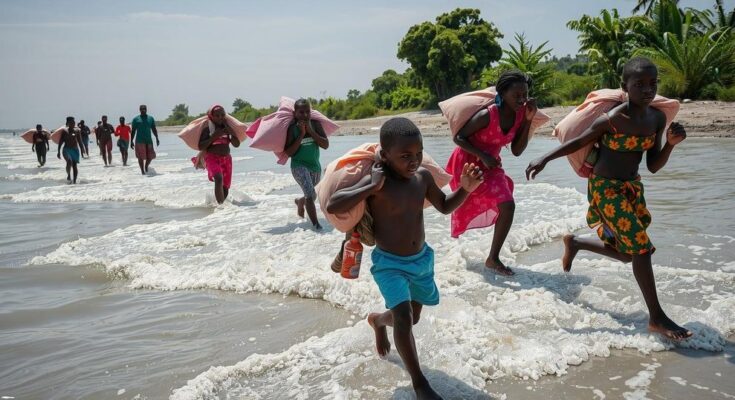Over 13,000 Mozambicans have fled to Malawi amid violence following a disputed presidential election in October. Many are women and children facing dire conditions, prompting urgent needs for food and resources. Humanitarian organizations, local authorities, and the UN are working to provide assistance and relocate asylum-seekers to better facilities.
Recently, over 13,000 Mozambicans have sought refuge in Malawi as a result of violence stemming from the contentious presidential election held in October. The influx of refugees includes numerous women and children, prompting concern among local authorities and humanitarian organizations. Among those displaced is Sofia Jimu, a traditional leader from the Tengani area, who highlighted the dire conditions at the evacuation center, specifically the lack of food which resulted in distress among the youngest evacuees. Fortunately, assistance arrived subsequently, providing them with essential food supplies.
The political unrest in Mozambique escalated after the Constitutional Council announced Daniel Chapo of the ruling Frelimo Party as the victor of the presidential election, a result contested by Venancio Mondlane of the opposition Podemos party. As protests erupted following the election, a monitoring group, Plataforma Decide, reported that over 200 fatalities have occurred since the unrest began.
Dominic Mwandira, the Nsanje district commissioner in Malawi, emphasized the critical challenge of resource shortages faced by the asylum-seekers in makeshift camps. He expressed gratitude for the support from governmental and humanitarian organizations like the Malawi Red Cross Society and Plan International, which have stepped in to assist the displaced individuals.
Plan International’s program area manager, Jane Mweziwina, affirmed their commitment to safeguarding vulnerable populations, particularly women, children, and individuals with disabilities in these emergency situations. There is a focus on ensuring these groups receive adequate accommodation, security, and food in the camps. To facilitate better living conditions, Malawi authorities are coordinating efforts to relocate the asylum seekers to more spacious centers. Additionally, a thorough assessment of the needs of these individuals is being undertaken by Malawi’s Department for Refugees in cooperation with the United Nations High Commissioner for Refugees.
The recent violence in Mozambique following the controversial presidential election has prompted a significant humanitarian crisis, with thousands fleeing to neighboring Malawi. Political tensions have escalated since the ruling party’s candidate was declared the winner, leading to protests that resulted in numerous fatalities. The increasing number of refugees places considerable strain on Malawi’s resources and highlights the urgent need for international support to address their needs adequately.
In conclusion, the situation surrounding the Mozambican refugees in Malawi remains critical as they flee violence from the disputed elections. Humanitarian organizations are actively working to provide necessary assistance, but challenges such as food shortages and overcrowding persist. The focus on the most vulnerable populations is paramount, and urgent measures are being implemented to improve their living conditions. Continued support and relocation plans will be essential to alleviate the crisis and address the humanitarian needs of these individuals.
Original Source: www.voanews.com




